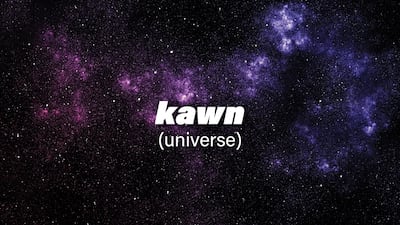The universe is a mystery.
Whether described as existing inside the mouth of the child Krishna in Hinduism, or as a backdrop for the great space epic Star Wars, a metaphor for the unpredictable nature of life in Douglas Adams’s novel The Hitchhiker's Guide to the Galaxy or a thing of infinite possibilities, bending time and space in Christopher Nolan’s Interstellar – the universe is many things at the same time.
This week’s Arabic Word of the Week is kawn, which, in the simplest terms, means the universe.
Specifically, from a scientific perspective, kawn refers to the stars, planets and the whole universe. Outside of this context it can also be used to reference other parallel universes. This is when the plural for kawn, akwan, can be used.
Kawn is a noun derived from the word kan, a verb made up of the three Arabic letters, kaf, alif, noon.
The word kan has a strong presence in the culture of storytelling in the Arab world. Most folk tales and stories in Arabic begin with the phrase, “Kan ya ma kan, fe qadeem al zaman,” which loosely translates to, “Once upon a time.”
While kan means something that has happened or something found, it also means a thing that once existed.
This makes sense as kawn can also refer to all things of existence. Another definition is the continuous existence of a living or non-living thing.
When used as a verb, kawn refers to something that came from or was created from nothing. Kawwana, which translates to created, and yukawwin, which translates to creating, are specifically used in this instance.
There are other words derived from kawn whose definitions follow a similar ethos to these ideas.
For example, from an Islamic perspective koun, which translates to be or exist, is an order in the Quran, highlighting God’s power and command over all things. In Islam, Al Kawn Al Aala, which translates to the higher creator, is one of many ways to refer to God.
Ka’ain can refer to any existing living or non-living creature – this can be a human, animal, bacteria or an object.
Takween refers to the physical process of anything being created while kawan means to make, create or design. From example, when someone creates a new idea, when someone designs the composition for a painting, or when someone makes or puts together a team for a sport.
Renowned Egyptian singer and composer Riad El Sunbati’s most classic song is entitled Ilah Al Kawn (Creator of the Universe), released in 1970. El Sunbati composed the music and wrote the lyrics in which he is seeking forgiveness and guidance from God.











































































